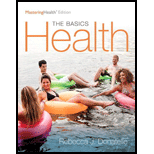
Health: The Basics, The Mastering Health Edition (12th Edition)
12th Edition
ISBN: 9780134183268
Author: Rebecca J. Donatelle
Publisher: PEARSON
expand_more
expand_more
format_list_bulleted
Concept explainers
Question
Chapter 10, Problem 2PQ
Summary Introduction
To identify: The
Introduction:
Obesity is a weight of the body, which is more than 20% above suggested levels or BMI (body mass index). BMI is a description of weight of the body relative to height of the body.
Overweight is a body weight, which is greater than 10% above healthy levels (BMI between 25 and 29). Overweight is considered as a weight above desirable or normal.
Expert Solution & Answer
Want to see the full answer?
Check out a sample textbook solution
Chapter 10 Solutions
Health: The Basics, The Mastering Health Edition (12th Edition)
Ch. 10 - Prob. 1WDYTCh. 10 - Prob. 2WDYTCh. 10 - What actions could you take to combat these...Ch. 10 - Prob. 4WDYTCh. 10 - Prob. 5WDYTCh. 10 - Prob. 6WDYTCh. 10 - Prob. 7WDYTCh. 10 - Prob. 8WDYTCh. 10 - Prob. 9WDYTCh. 10 - Prob. 1WDYS
Ch. 10 - Prob. 2WDYSCh. 10 - Prob. 1PQCh. 10 - Prob. 2PQCh. 10 - Prob. 3PQCh. 10 - Prob. 4PQCh. 10 - Prob. 5PQCh. 10 - Prob. 6PQCh. 10 - Prob. 7PQCh. 10 - Prob. 8PQCh. 10 - Prob. 9PQCh. 10 - Prob. 10PQCh. 10 - Prob. 1TAICh. 10 - Prob. 2TAICh. 10 - Prob. 3TAICh. 10 - Prob. 4TAICh. 10 - Prob. 1PQACh. 10 - Prob. 2PQACh. 10 - Prob. 3PQA
Knowledge Booster
Learn more about
Need a deep-dive on the concept behind this application? Look no further. Learn more about this topic, health-nutrition and related others by exploring similar questions and additional content below.Similar questions
- Basal metabolic rate is a measure of ______. a. the total amount of calories you burn in 24 hours b. the amount of food energy needed to sustain basic body operations c. the amount of energy burned by skeletal muscle in a given period d. both a and barrow_forwardThe hormone insulin enhances the transport of glucose (sugar) from the blood into most body cells. Its secretion is controlled by a negative-feedback system between the concentration of glucose in the blood and the insulin-secreting cells. Therefore, which of the following statements is correct? A decrease in blood glucose concentration stimulates insulin secretion, which in turn further towers blood glucose concentration. An increase in blood glucose concentration stimulates insulin secretion, which in turn lowers blood glucose concentration. A decrease in blood glucose concentration stimulates insulin secretion, which in turn increases blood glucose concentration. An increase in blood glucose concentration stimulates insulin secretion, which in turn further increases blood glucose concentration. None of the preceding is correct.arrow_forwardSome nutritionists claim that the secret to long life is to be slightly underweight as an adult. If a persons weight is related partly to diet, partly to activity level, and partly to genetics, what underlying factors could be at work to generate statistics that support this claim?arrow_forward
- Which of the following statements is not true? a. Essential nutrients can be synthesized by the body. b. Vitamins are required in small quantities for bodily function. c. Some amino acids can be synthesized by the body, while others need to be obtained from diet. d. Vitamins come in two categories: fat-soluble and water-soluble.arrow_forwardThe preferred energy sources for the body are ________.arrow_forwardAfter you eat too many carbohydrates and proteins, your body converts the excess to storage fats, which accumulate in.____________. a. loose connective tissue b. . dense connective tissue c. adipose tissue d. both b and carrow_forward
- Researchers set up an obesity study in which MZ and DZ twins who served in the armed forces were studied at induction into the military and 25 years later. Results indicated that obesity has a strong genetic component. a. What are some of the problems with this study? b. Design a better study to test whether obesity has a genetic component.arrow_forwardWhere does the majority of fat digestion take place? a. mouth b. stomach c. small intestine d. large intestinearrow_forward
arrow_back_ios
arrow_forward_ios
Recommended textbooks for you
 Human Biology (MindTap Course List)BiologyISBN:9781305112100Author:Cecie Starr, Beverly McMillanPublisher:Cengage Learning
Human Biology (MindTap Course List)BiologyISBN:9781305112100Author:Cecie Starr, Beverly McMillanPublisher:Cengage Learning
 Human Physiology: From Cells to Systems (MindTap ...BiologyISBN:9781285866932Author:Lauralee SherwoodPublisher:Cengage Learning
Human Physiology: From Cells to Systems (MindTap ...BiologyISBN:9781285866932Author:Lauralee SherwoodPublisher:Cengage Learning

Human Biology (MindTap Course List)
Biology
ISBN:9781305112100
Author:Cecie Starr, Beverly McMillan
Publisher:Cengage Learning



Human Physiology: From Cells to Systems (MindTap ...
Biology
ISBN:9781285866932
Author:Lauralee Sherwood
Publisher:Cengage Learning

